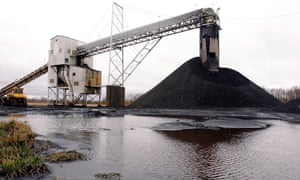Extract from The Guardian
Norway’s sovereign wealth fund, the world’s biggest, has excluded 52
coal-related companies in line with new ethical guidelines barring it
from investing in such groups, Norway’s central bank said on Thursday.
The move was seen as a sign of the growing influence investors wield in the fight against climate change.
In June 2015, the Scandinavian country’s parliament agreed to pull the fund out of mining or energy groups which derive more than 30% of their sales or activities from the coal business.
The new directive went into effect on 1 February.
The fund, fuelled by Norway’s state oil revenues and currently worth around 7.11tn trillion kroner (£610bn, $864bn), has banned 52 companies, most of them US and Chinese, including China Coal Energy, AES, and Peabody Energy, the biggest US coal producer which filed for bankruptcy on Wednesday.
The list also includes several Indian companies, such as Reliance Power and Tata Power, three Japanese groups and several European companies.
“Further exclusions will follow in 2016,” the central bank, which manages the fund, said in a statement.
Thursday’s announcement was hailed by environmentalists.
“It’s an important first step,” Martin Norman, the head of Greenpeace Norway, told AFP.
“The road ahead remains long though,” he added, noting that his organisation had a while ago counted 122 companies the fund needed to bar to be in line with the new directive.
The world’s three biggest coalmakers – Anglo American, BHP Billiton and Glencore – are not affected by the new rules because their other mining activities are so massive that their coal businesses represent less than 30% of their overall revenues.
But Norman said he hoped they would soon be excluded because of another criteria adopted last year, which prohibits the fund from investing in groups that produce “unacceptable levels” of greenhouse gas emissions.
“It’s a good start,” added Marius Holm, the head of the environmental group Zero.
“But the fund still holds stakes in coal-related companies, and its exposure to oil and gas also needs to be discussed,” he said.
The fund’s investment policy is run according to strict ethical rules, with a focus on sustainable economic, environmental and social development.
Those rules bar it from investing in companies accused of serious violations of human rights, child labour or serious environmental damage, as well as manufacturers of “particularly inhumane” arms, and also tobacco firms.
The list of 52 companies includes some of those the fund has divested from since 2013 on its own initiative, judging the companies’ environmental impact was damaging to their financial viability.
Controlling 1.3% of the world’s market capitalisation, the fund is intended to finance Norway’s generous welfare state indefinitely.
The move was seen as a sign of the growing influence investors wield in the fight against climate change.
In June 2015, the Scandinavian country’s parliament agreed to pull the fund out of mining or energy groups which derive more than 30% of their sales or activities from the coal business.
The new directive went into effect on 1 February.
The fund, fuelled by Norway’s state oil revenues and currently worth around 7.11tn trillion kroner (£610bn, $864bn), has banned 52 companies, most of them US and Chinese, including China Coal Energy, AES, and Peabody Energy, the biggest US coal producer which filed for bankruptcy on Wednesday.
The list also includes several Indian companies, such as Reliance Power and Tata Power, three Japanese groups and several European companies.
“Further exclusions will follow in 2016,” the central bank, which manages the fund, said in a statement.
Thursday’s announcement was hailed by environmentalists.
“It’s an important first step,” Martin Norman, the head of Greenpeace Norway, told AFP.
“The road ahead remains long though,” he added, noting that his organisation had a while ago counted 122 companies the fund needed to bar to be in line with the new directive.
The world’s three biggest coalmakers – Anglo American, BHP Billiton and Glencore – are not affected by the new rules because their other mining activities are so massive that their coal businesses represent less than 30% of their overall revenues.
But Norman said he hoped they would soon be excluded because of another criteria adopted last year, which prohibits the fund from investing in groups that produce “unacceptable levels” of greenhouse gas emissions.
“It’s a good start,” added Marius Holm, the head of the environmental group Zero.
“But the fund still holds stakes in coal-related companies, and its exposure to oil and gas also needs to be discussed,” he said.
The fund’s investment policy is run according to strict ethical rules, with a focus on sustainable economic, environmental and social development.
Those rules bar it from investing in companies accused of serious violations of human rights, child labour or serious environmental damage, as well as manufacturers of “particularly inhumane” arms, and also tobacco firms.
The list of 52 companies includes some of those the fund has divested from since 2013 on its own initiative, judging the companies’ environmental impact was damaging to their financial viability.
Controlling 1.3% of the world’s market capitalisation, the fund is intended to finance Norway’s generous welfare state indefinitely.

No comments:
Post a Comment